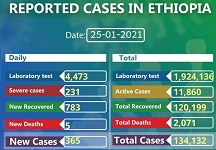By Fitsum Workneh – Adolescence is a unique and critical stage of life, the biological and psychological changes that occur at this period puts them at risk of several sexual and reproductive problems unless equipped with appropriate knowledge, and the healthcare system is expected to be considerate of their needs.
The impact of COVID- 19 pandemic has been felt across the world regardless of economic status of the countries. Health care delivery has been compromised due to increased patient load and health workers overwork. In addition, people are afraid to visit health facilities, since they associate going there with increased risk of exposure to COVID-19. COVID-19 prevention measures are needed everywhere; health facilities do not particularly expose clients to COVID -19 when the necessary preventive measures are applied strictly.
COVID-19 has already disrupted adolescents’ access to health services. In many places, health facilities have closed or have limited the services that are available. Clinical staff who are occupied with the COVID-19 response may have less time to provide services, or lack the personal protective equipment to do so safely. In addition, supply chain disruptions are significantly limiting the availability of supplies and commodities. This includes disruption of contraceptive supply chains and the ability to travel to health facilities, putting young people at greater risk of unintended pregnancy by reducing their access to information and contraceptive services.
The misconception about increased risk of COVID -19 while visiting health facilities can limit adolescents from visiting youth friendly service which provides comprehensive reproductive health services. Many of the services provided, such as HIV counseling and testing; contraceptive services and pregnancy testing; sexual abuse and violence prevention and management; sexually transmitted infection management…etc. are likely to be affected in one way or another. Decrease in utilization of these services would result in preventable complications, which could have lasting effect on the individuals.
Ethiopia is the second populous country in Africa, young people (aged 10-24), comprise about 35 percent of the population. Several sexual and reproductive health (SRH) problems affect young people in Ethiopia; these include early marriage and early childbearing, unintended pregnancies, unsafe abortion, pregnancy-related complications, and STIs. Young women are particularly vulnerable to poor SRH outcomes because of poverty and gender inequality.
Adolescents in Ethiopia have limited access to reproductive health services designed to specifically address their special needs. Unmet need for sexual and reproductive health services is high among adolescents in low- and middle-income countries. Failure to utilize what is available could make the already compromised adolescent health worth in these settings. In Ethiopia, even though different organizations have been supporting sexual and reproductive health needs of youth, utilization of those services is low (about 30%).
Majority of adolescents do not know correctly where such services are available, SRH services are considered mainly for married couple, as premarital sexual experience is a taboo; no one wants to be seen using RSH services. Several studies have shown that about one-third of married young women in Ethiopia have unmet needs for contraception. This would result in unintended pregnancy and unsafe abortion. Only close to half of the young mothers deliver in a health facility, the rest remain at risk of obstetrics and newborn complications; the main reason why death of mothers and newborn babies remained one of the highest in the world.
Fear of acquiring COVID-19 should not compromise health care utilization, rather implementation of preventive measures such as use of face mask, social distancing (at least 2 meters), frequent hand washing or using hand sanitizers, and avoiding touching eyes, mouth or nose with unclean hands has to be practiced regularly.
Awareness creation and promotion of youth friendly services has to be done to avoid unnecessary suffering and complications that could occur because of fear of acquiring COVID-19. Health care seeking behavior of young people could be addressed through peer education intervention. The risk of acquiring severe COVID-19 infection is very rare in children and young adults, as most of them are likely to be symptom free or experience mild disease.
The risk of avoiding health facility visit during the pandemic outweighs the benefit, the community has to get the right information and be encouraged to utilize youth friendly service.

